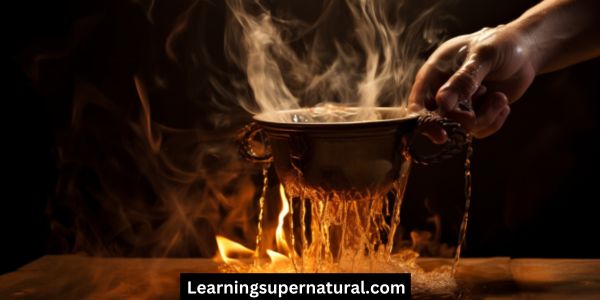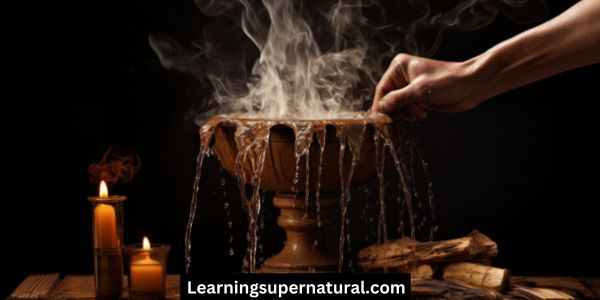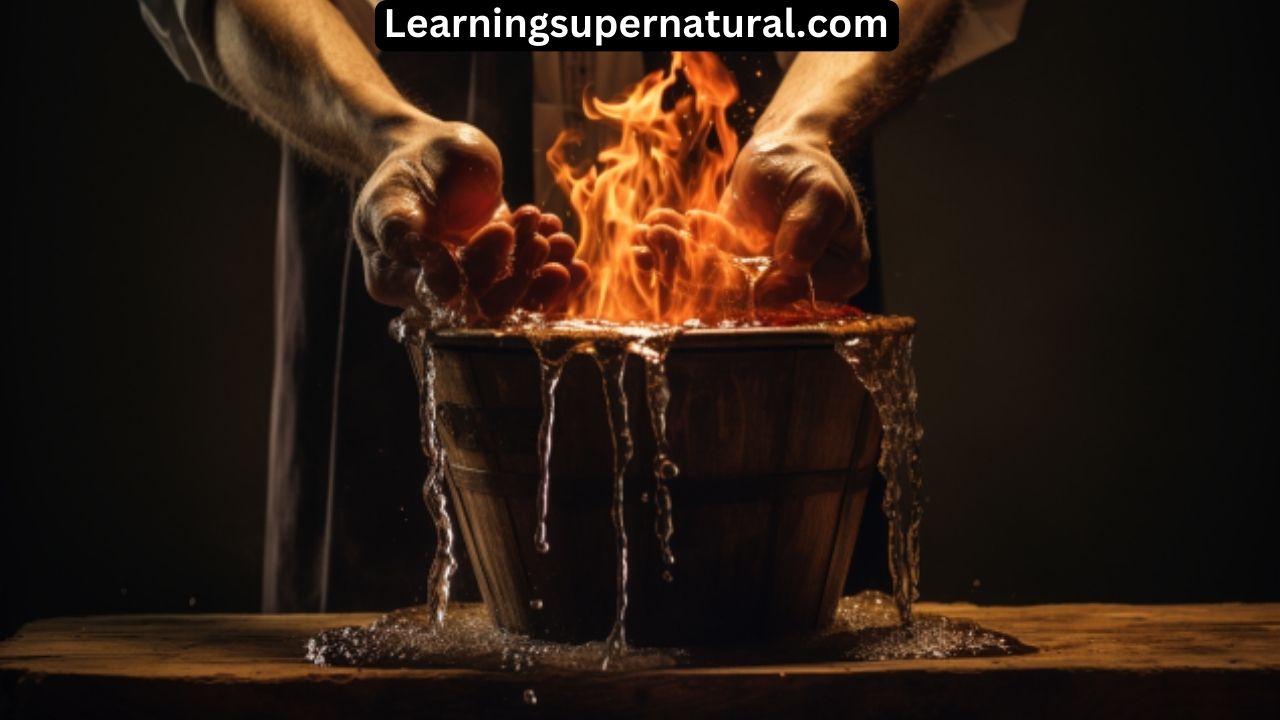Exorcism is a ritual or ceremony that has been used for centuries to rid people of demonic possession. While many aspects of the exorcism process have changed over time, one thing remains constant: holy water.

Holy water plays an essential role in modern-day exorcisms and has deep spiritual significance and meaning within religious traditions. In this article, we’ll explore why holy water is so important during an exorcism and what its presence means.
We will also discuss how it’s prepared and blessed before being used to ‘cleanse’ those who are believed to be possessed by evil spirits or demons. We’ll look at how different religions use holy water as part of their rituals, from Christianity to Islam and beyond.
Finally, we’ll consider the controversy surrounding the practice of using holy water in exorcism today.
History And Use Of Holy Water In Exorcism
Holy water is an important element in the exorcism ritual and has been used for centuries by many religions. It is said to have supernatural powers that can help drive out evil spirits, protect against negative influences, and even heal illnesses.
Ancient rituals which date back thousands of years often involve sprinkling or bathing with holy water as part of their spiritual practices.
In some cases, priests will use a special formula to create holy water from natural ingredients such as salt, wine, herbs, or oils. After being prepared according to religious guidelines, it must be blessed before it can be used for its intended purpose.
This blessing process typically includes prayers and invocations that are meant to activate the supernatural power of the water. Going forward, we will discuss how this preparation and blessing take place.
How Holy Water Is Prepared And Blessed?
Holy water is an important element in the exorcism ritual. It is prepared and blessed with a special spiritual preparation that involves a series of ritual blessings:
- Prayers are said over clean, filtered or boiling water to invoke God’s blessing on it.
- The priest then adds salt to represent purification and sanctification of the water.
- Finally, the priest will bless the holy water using sacred words from scripture or specific prayers for this purpose.
The process of preparing the holy water reinforces its symbolic power as a tool against demonic forces and provides spiritual protection when used during an exorcism ceremony.
This emphasis on spiritual preparation demonstrates how powerful and significant holy water can be when used correctly within this context.
By understanding what goes into creating it before being deployed, one can recognize its meaning and importance in protecting people from evil spirits.
The Symbolic And Spiritual Meaning Of Holy Water

Holy water has been used in ritualistic practice for centuries and is still commonly used today.
According to a study conducted by the Catholic News Agency, over 80% of Catholics globally believe that holy water has special meaning and power derived from God. This table shows the different types of holy water available around the world:
| Region | Type of Holy Water |
|---|---|
| Europe | Baptismal font |
| Africa | Streams/Rivers |
| Asia | Lake/Ocean |
The symbolic meaning behind holy water can be traced back through religious tradition as far as ancient Egypt, where it was believed to have magical powers that could heal ailments.
Even today, many faiths consider it to contain Divine power which can protect against evil spirits or remove spiritual impurities. In some cases, sprinkling holy water onto objects or people is thought to possess cleansing properties.
The use of holy water not only provides believers with physical protection but also serves as an act of faith and devotion towards their religion’s beliefs. By using this important element, individuals are able to engage in a meaningful ritual with its deep spiritual connotations.
It is no surprise then that various religions across time have welcomed this powerful symbol into its traditions.
Religious Traditions Utilizing Holy Water
Holy water, which has been used for centuries as a spiritual and symbolic tool, can also be utilized in religious traditions.
In Christianity, holy water is often associated with ritual blessings such as those performed during baptism ceremonies. It is common for churches to keep fonts of the blessed liquid near their altars or entrances so that worshippers may dip their fingers into it before entering the church. Furthermore, many Christians believe that holy water possesses protective powers against evil spirits and other negative energies.
The use of holy water carries great significance due to its association with sacred symbols like the cross — a universal sign of Christ’s victory over death. Beyond these traditional uses of holy water, an ongoing controversy surrounds its utilization in exorcism rituals.
While some faith groups are supportive of this practice, others have expressed concern about potential misuse or abuse of power by clergy members conducting such rites. This ethical dilemma continues to spark debate among theologians and believers alike.
As we move forward from discussing the symbolic and spiritual meaning of holy water, let us explore how various religions employ this substance within their own contexts.
Controversy Surrounding The Use Of Holy Water In Exorcism

The use of holy water in exorcism has been a controversial topic for centuries. Many religious denominations believe that it is blessed by angelic powers and can be used to physically repel evil spirits from the possessed person.
However, there are also those who doubt its efficacy and argue that the ritualistic practice may do more harm than good.
Here are some key points to consider when discussing this issue:
- The true origin behind the use of holy water remains unknown; many theories exist but none have been confirmed
- It is unclear whether or not using holy water really does anything other than provide psychological comfort to believers
- Some point out that if done incorrectly, using holy water could potentially cause physical effects such as burns or blisters on the skin of a possessed individual
- There is disagreement among theologians about how effective holy water truly is in exorcisms
It is clear that there are different opinions on this matter and further research will likely continue to uncover new insights. Nevertheless, one thing we know for sure is that it continues to be an important aspect of religious ceremonies today.
Frequently Asked Questions {FAQs}
Are There Any Alternatives To Using Holy Water In An Exorcism?
When it comes to exorcisms, holy water is often seen as the go-to option. But when you’re in a pinch and can’t get your hands on any, are there any other alternatives?
To put it simply: yes! While holy water has its own supernatural effects and spiritual efficacy, it’s not the be all and end all of exorcism practices. In fact, depending on the particular situation or culture one is dealing with, various rituals and techniques may need to be employed in order to achieve successful results.
For example, some cultures believe that burning sage could help ward off malicious spirits while others might rely on prayer or chanting for similar outcomes. Ultimately, whatever method works best should be chosen – after all, an ounce of prevention is worth a pound of cure!
What Are The Health And Safety Precautions For Using Holy Water In An Exorcism?
Using holy water in an exorcism has spiritual and religious implications, so it is important to take health and safety precautions before doing so.
While the practice of using holy water for spiritual purposes goes back centuries, modern practitioners need to be aware of its potential danger if used improperly or without knowledge of how to handle it.
Any use of holy water should include respect for religious practices as well as awareness of any relevant legal issues.
Does Holy Water Really Have The Power To Ward Off Evil Spirits?
While there is debate among religious scholars as to the power of holy water in exorcism rituals, many people believe it holds some form of spiritual significance.
Interesting statistics indicate that over two-thirds of believers surveyed say they have seen a direct connection between using holy water during an exorcism and its effectiveness.
This suggests that there may be something to this ritual’s power sources beyond what can be measured by science or logic.
So does holy water really have the power to ward off evil spirits? Those who rely on faith are sure it does!
Are There Any Special Rituals Or Ceremonies Associated With Using Holy Water In An Exorcism?
The use of holy water in an exorcism is a spiritual ceremony with religious efficacy. It involves the recitation of sacred words, blessings, and invocations to ward off evil forces or spirits.
In addition to this, there are certain symbols associated with its application – such as crucifixes, candles, incense and other ritualistic items – that have deep spiritual symbolism embedded within them.
These rituals not only serve to strengthen the exorcist’s prayer but also give greater focus on the protection provided by God through his divine power.
Is There Any Scientific Evidence That Supports The Use Of Holy Water In Exorcism?
For many, the use of holy water in exorcisms may seem like an ancient superstition or spiritual symbolism with no scientific basis. However, research has shown that there is some evidence to suggest that it could have a role to play in combating evil forces and providing comfort during difficult times.
While these beliefs cannot be proven conclusively, they do suggest that using holy water as part of an exorcism ritual can bring about positive results for those who believe in its power.
Conclusion
Holy water has been used in exorcisms for centuries, and it continues to be an important part of the ritual today.
It is a powerful symbol that can ward off evil spirits and protect those who take part in the ceremony.
While there may not be scientific evidence to back up its efficacy, many believe that holy water has spiritual significance and power.
The use of holy water in exorcism is steeped in history; it’s as if time stands still when we consider how far back this tradition dates.
So while modern science may not provide concrete answers about its effects, one thing remains clear: Holy water will likely remain a significant part of the ritual for generations to come.




